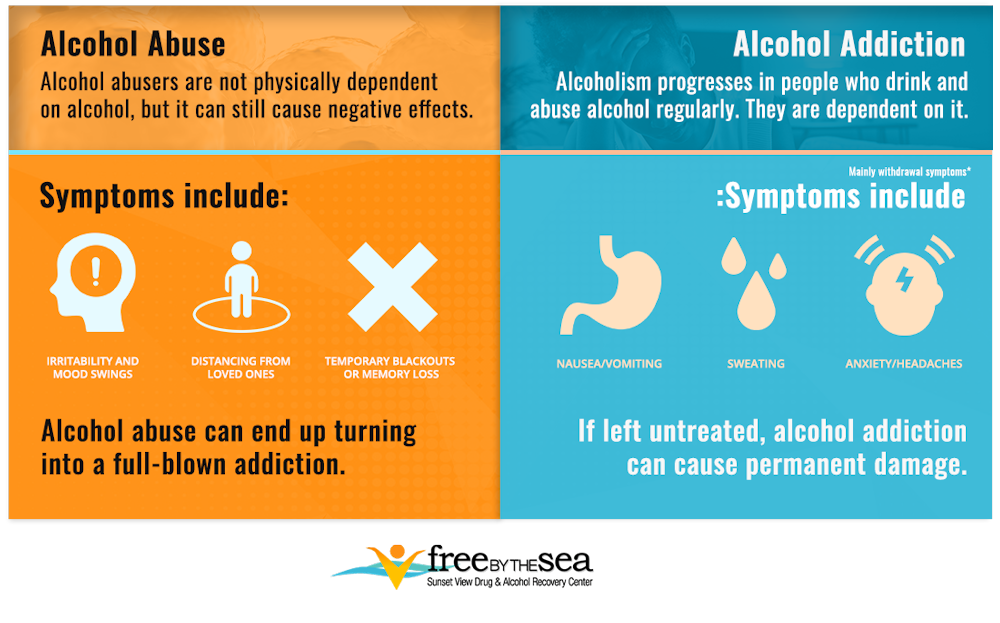In the State of Washington, Free by the Sea can provide you or a loved one with alcohol addiction and abuse treatment. Our facility is one of the finest for recovering from alcohol, and our experienced and trained staff provide the most comfortable rehabilitative care possible. You need an understanding team that you can put your trust in. The worthy professionals at Free by the Sea know how to get you through the hardest phases of withdrawal and recovery safely.
We are serving the Nation, based in the Pacific Northwest.
What is Alcohol?
Alcohol is a legally controlled substance that is often consumed as a social lubricant. It’s created by a fermentation process that involves yeast, sugar, and starches. The ingredient ethyl alcohol, which is created during the fermentation process, is what causes alcohol’s intoxicating effects. Alcoholic drinks include beer, wine, and hard liquors like vodka and tequila.
What Is Alcohol Abuse?
When you drink too much alcohol, you are at risk for alcohol abuse, a condition common among young adults and college students who binge drink at parties and bars. Alcohol affects your inhibitions and mood, impairs your judgment, and distorts your thoughts. When you abuse alcohol, you are putting yourself and the people who surround you in danger.
Individuals with diminished inhibitions and motor skills are more likely to put themselves in dangerous positions, including driving while under the influence. Abusing alcohol makes you a very visible target for authorities, and this could potentially result in heavy legal consequences.
Alcohol abuse and alcoholism are different. Alcohol abusers are not physically dependent on alcohol, but even infrequent episodes of alcohol abuse can permanently damage their livelihoods. They’re also highly likely to progress into addictions.
Understanding Alcohol Addiction
Alcoholism progresses in individuals who drink or abuse alcohol regularly. An alcoholic’s body completely depends on the substance and requires it to function. The longer the individual abuses alcohol and does not seek treatment, the more tolerant the body becomes. This progression results in the individual needing more alcohol to achieve the same effects.
Alcohol addiction can eventually become so powerful that alcoholics feel like they can’t live without it. Even going without it for one day could lead to serious and sometimes deadly symptoms of withdrawal, so these individuals usually start drinking when their days begin to avoid those symptoms.
Individuals who are suffering from alcohol addiction could be drinking to deal with stress, sneaking drinks throughout their day, or drinking alone. It is difficult for alcoholics to stay sober, and it can be very dangerous for them to get clean. They should seek professional medical attention to ensure they remain safe and healthy throughout the process.
What Are the Warning Signs of Alcohol Abuse and Addiction?
There are many signs and symptoms an alcohol-dependent individual can look out for when self-diagnosing an alcohol use disorder. Alcohol abuse can be a tell-tale sign that alcoholism is on the way. Signs and symptoms of alcohol addiction are more severe variations of what one will experience when they are just abusing alcohol.
If left untreated, alcohol abuse can quickly progress into alcohol addiction. When alcohol abuse begins to negatively affect an individual’s life and cause harm, it is diagnosed as an alcohol use disorder (AUD).
The impact of alcohol abuse can be seen in symptoms such as:
- Experiencing temporary blackouts or short-term memory loss
- Showing signs of irritability and severe mood swings
- Making excuses for drinking such as claiming it’s just a way to deal with stress
- Prioritizing drinking over other responsibilities
- Distancing oneself from loved ones
- Drinking alone or in secrecy
- Feeling hungover when not drinking
Recognizing Alcohol Addiction
Determining whether or not someone has a serious alcohol addiction can be determined through a variety of different methods. One tool is known as CAGE – a questionnaire that measures the severity of alcohol use. If you answer “yes” to two or more CAGE questions, we recommend seeking professional rehabilitation treatment as soon as possible.
The four CAGE screening questions are:
- Have you ever felt you should cut down on your drinking?
- Have people annoyed you by criticizing your drinking?
- Have you ever felt bad or guilty about your drinking?
- Have you ever had a drink first thing in the morning to steady your nerves or get over a hangover?
Treating Alcohol Abuse and Alcohol Addiction
Due to the dangerous symptoms of withdrawal that arise when alcoholics try to stop drinking cold turkey, they must go through medical detox to ensure they remain safe. When the detox is over, they have to go to therapy, counseling or both to get assistance in regaining control of their lives.
This process of rehabilitation helps them understand the underlying causes of their drinking and helps them develop healthier behaviors. If you or a loved one frequently abuse alcohol or suffer from alcohol addiction, at least consider getting involved with a support group.
Alcohol Withdrawal and Detox
Long term consumption of alcohol has serious effects on an individual’s physical and mental health. If you try stopping abruptly, you’ll most likely experience withdrawal symptoms. These symptoms occur as a result of your body learning to function without the substance. Symptoms can range from moderate to severe.
The signs of alcohol withdrawal can include:
- Anxiety
- Shaky hands
- Headache
- Nausea
- Vomiting
- Insomnia
- Sweating
Alcohol detox, otherwise known as detoxification, is the natural process your body undergoes as it attempts to cleanse toxins accumulated through alcohol use. In most cases, detoxification consists of three steps:
- Intake. This will incorporate an in-depth evaluation of drug, medical and psychiatric histories of incoming recovering individuals to accurately assess the addiction.
- Medication. Medication may be used to temporarily lessen and control alcohol withdrawal symptoms.
- Stabilization. Different evidence-based methods, including a variety of therapies, are a vital component of treatment.
Following Alcohol Detoxification: Residential Treatment
Following detoxification, the core components of addiction treatment can begin. There are varying levels of care depending on the severity of your addiction and unique needs. Residential treatment, also known as inpatient rehabilitation, is the highest level of care available.
Residential treatment offers 24/7 medical supervision and support. Recovering individuals will reside at the facility and follow a structured routine every day. The length of the program runs anywhere from 28 to 90 days, depending on the unique individual’s needs.
Our residential treatment programs prioritize the use of therapy to change the thoughts and behaviors regarding alcohol abuse. Addressing the underlying mental and emotional roots of addiction is key. Research-based counseling programs enable recovering individuals to observe the triggers of their addictive behaviors and develop skills to counter these cravings and temptations.
A few of the core therapies we provide are:
- Cognitive Behavioral Therapy
- Interpersonal therapy
- Dialectical Behavior Therapy
- Family counseling
- Motivational Enhancement Therapy
Following Alcohol Detoxification: Outpatient Treatment
Outpatient treatment is another level of care offered at our rehabilitation center. Within outpatient treatment, there are also varying levels of care with different time requirements. The main aspect all of these outpatient programs have in common is that members of treatment do not need to reside at the facility.
Instead, they will travel to our center for addiction treatment. Outpatient care generally incorporates motivational interviewing, contingency management, 12-step work, cognitive behavioral therapy, group therapy, and one-on-one counseling.
The main aspects of a successful outpatient program are:
- Medical services, including medication management
- Treatment for co-occurring mental health conditions
- Individual therapy
- Group therapy
- Relapse prevention
Why Choose Free by the Sea?
Free by the Sea is a recovery center that aims to provide high-quality treatment and care to each recovering individual. No matter what stage of addiction you’re in, our goal is to show you the potential that you’ve always had. We also put a major emphasis on the notion that we’re in this together. At Free by the sea, we’re a family. We’re eager to share many benefits with you such as:
- Certified Substance Abuse Counselors, including licensed Mental Health Therapists.
- Relapse Prevention, Life Skills, Addiction education provided in groups and individual sessions
- Twelve-step meetings such as celebrate recovery, wellbriety, dual disorder and AA/NA/GA
- Residential, partial hospitalization, and intensive outpatient levels of care
- Peaceful and safe setting located on five acres facing the Pacific Ocean
- Volleyball/basketball courts and an exercise room
- Nutritious meals
Overcome Alcohol Addiction and Regain Control of Your Life by Calling Free by the Sea Today!
Alcohol addiction traps individuals in a circle of self-loathing and momentary relief, and anyone can find reasons to want to break that cycle. Addiction to alcohol is damaging to the drinkers, their relationships, and their jobs. When the addiction continues without treatment, it will take everything that the individuals have. If you or a loved one wants help with alcohol addiction or abuse, do not hesitate to contact Free by the Sea today.
You or your loved one can break the cycle of addiction and get the treatment and help you need and deserve. Contact Free by the Sea, a State of Washington recovery facility, today to take the first step toward a happier lifestyle without alcohol abuse or addiction.

Dr. Richard Crabbe joined our team in 2019 as our psychiatrist and medical director. He attended the University of Ghana Medical School where he became a Medical Doctor in 1977. From 1978 through 1984, he was a medical officer in the Ghana Navy and provided a variety of services from general medicine to surgeries. He received his Certificate in General Psychology from the American Board of Psychology and Neurology in 2002.




